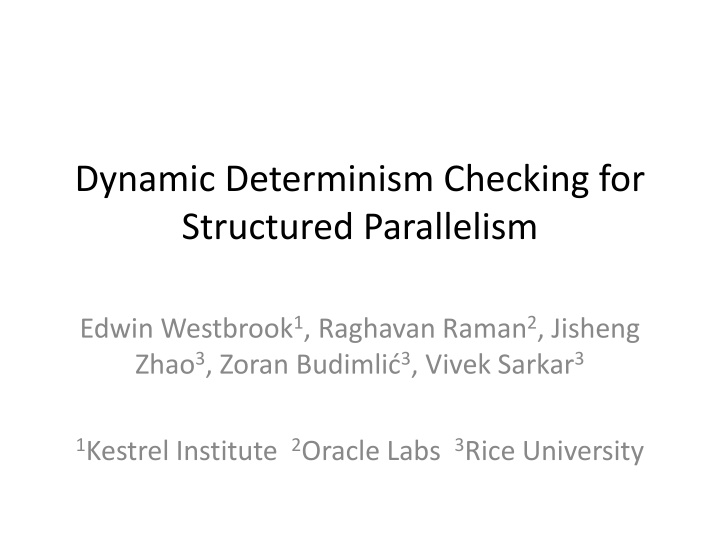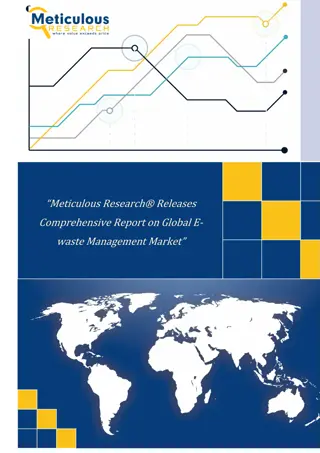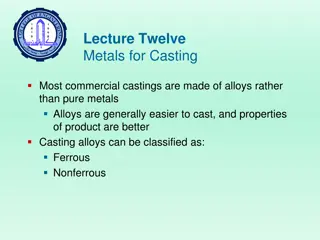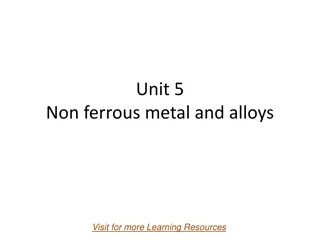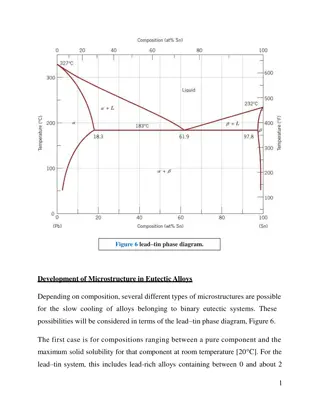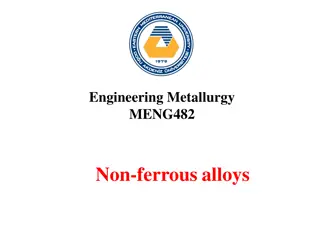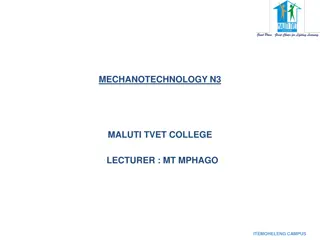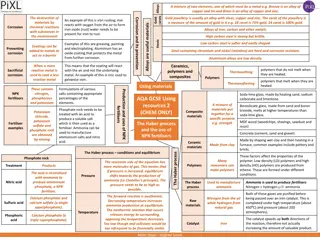Madhvesh Overseas - Manufacturer of Ferrous and Non-Ferrous Alloys" (from the given first 150 characters)
Madhvesh Overseas is a manufacturer of ferrous and non-ferrous alloys, specializing in high-quality special and super alloys. Their manufacturing facility caters to petroleum products and offers a range of products including bi-metallic and tri-metallic alloy pipes. They focus on meeting customer expectations, operating with honesty and integrity, and continuously improving their processes. Their competency lies in manufacturing special and super alloys grade casting, mechanized operations, and NDT testing customizable to meet client requirements. They also provide ferrous and non-ferrous castings for defense, oil and gas exploration, and refinery industries.
Download Presentation

Please find below an Image/Link to download the presentation.
The content on the website is provided AS IS for your information and personal use only. It may not be sold, licensed, or shared on other websites without obtaining consent from the author.If you encounter any issues during the download, it is possible that the publisher has removed the file from their server.
You are allowed to download the files provided on this website for personal or commercial use, subject to the condition that they are used lawfully. All files are the property of their respective owners.
The content on the website is provided AS IS for your information and personal use only. It may not be sold, licensed, or shared on other websites without obtaining consent from the author.
E N D
Presentation Transcript
Dynamic Determinism Checking for Structured Parallelism Edwin Westbrook1, Raghavan Raman2, Jisheng Zhao3, Zoran Budimli 3, Vivek Sarkar3 1Kestrel Institute 2Oracle Labs 3Rice University
Deterministic Parallelism for the 99% Parallelism is crucial for performance Hard to understand for most programmers Deterministic parallelism is much easier In many cases, non-determinism is a bug How to catch / prevent non-determinism bugs?
Two Sorts of Code 1. High-performance parallel libraries Uses complex and subtle parallel constructs Written by concurrency experts: the 1% 2. Deterministic application code Uses parallel libraries in a deterministic way Parallelism behavior is straightforward Written by everybody else: the 99% We focus on application code
Determinism via Commutativity 1. Identify pairs of operations which commute Operations = parallel library primitives (the 1%) Verified independently of this work 2. Ensure operations in parallel tasks commute I.e., verify the application code (the 99%)
Our Approach: HJd HJd = Habanero Java with determinism Builds on our prior race-freedom work [RV 11,ECOOP 12] Determinism is checked dynamically For application code, not parallel libraries Determinism failures throw exceptions Because non-determinism is a bug! Checking itself uses a deterministic structure Leads to low overhead: 1.26x slowdown!
Example: Counting Factors in Parallel class CountFactors { int countFactors (int n) { AtomicInteger cnt = new AtomicInteger(); finish { for (int i = 2; i < n; ++i) async { if (n % i == 0) cnt.increment(); }} return cnt.get (); }} Fork task Join child tasks Increment cnt in parallel Get result after finish
Specifying Commutativity for Libraries Methods annotated with commutativity sets Each pair of methods in set commute Syntax: @CommSets{S1, ,Sn} <method sig> States method is in sets S1 through Sn Commutes with all other methods in these sets
Commutativity Sets for AtomicInteger get commutes with itself final class AtomicInteger { @CommSets{"read"} int get () { ... } @CommSets{"modify"} void increment() { ... } @CommSets{"modify"} void decrement() { ... } @CommSets{"read","modify"} int initValue() { ... } int incrementAndGet () { ... } inc/dec commute with themselves and each other Commutes with anything Commutes with nothing (not even itself)
Irreflexive Commutativity Some methods do not commute with themselves, but commute with other methods Specified with @Irreflexive
Example #2: Blocking Atomic Queues final class AtomicQueue { @CommSets{"modify"} @Irreflexive void add (Object o) { ... } @CommSets{"modify"} @Irreflexive Object remove () { ... } } Add and remove commute: queue order unchanged Self-commuting add (or remove) changes the queue!
Commutativity means Commutativity Queue add might self-commute for some uses E.g. worklist-based algorithms: each queue item is consumed in the same way Still cannot mark add as self-commuting Instead, change library to capture use case
Example #3: Atomic Worklists final class AtomicWorklist { interface Handler () { void handle (Object o); } void setHandler (Handler h) { ... } @CommSets{"modify"} void add (Object o) { ... } } Now add self-commutes: all elems get same handler
Dynamically Verifying Determinism Each parallel library call a dynamic check Ensures no non-commuting methods could possibly run in parallel HJd exposes these checks to the user Construct called permission region[RV 11] Many calls can be grouped into one check See our paper for more details
The Key to Dynamic Checks: DPST DPST = Dynamic Program Structure Tree Deterministic representation of parallelism May-happen-in-parallel check with no synch Low overhead!
DPST by Example finish { finish { async { S1; } S2; } S3; } F F S3 A S2 S1
May-Happen-In-Parallel with DPST 1. Find least common ancestor (LCA) of 2 nodes 2. Check if leftmost child of LCA on LCA node path is an async 3. If so, return true, otherwise return false
MHIP with DPST finish { finish { async { S1; } S2; } S3; } F F S3 A S2 S1 Not in parallel
MHIP with DPST finish { finish { async { S1; } S2; } S3; } F F S3 A S2 S1 Maybe in parallel
Results: Slowdown 1.26x slowdown
Conclusions: Determinism for the 99% Deterministic parallelism is easier Non-determinism is often a bug For application code, the 99% HJd reports non-determinism bugs with low overhead: 1.26x
Related Work on HJ Race freedom determinism for HJ (PPPJ 11) Finish accumulators (WoDet 13) Race-freedom for HJ (RV 11, ECOOP 12)
DPST for Permission Regions finish { permit m1(x) { async { S1; }} async { permit m2(y) { S2; } } permit m3(x) { S3; }} F P1 A2 P3 A1 P2 S3 S1 S2
